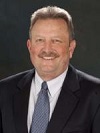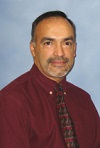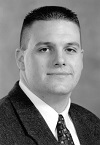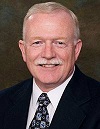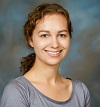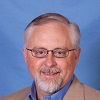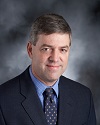- Back to Ruminant Nutrition Symposium
26th Annual Florida Ruminant Nutrition Symposium, February 2-4, 2015
Speaker Biographies
|
Dr. John Arthington is a graduate of the Animal Sciences Departments of Purdue University (BS) and Kansas State University (MS and PhD) and has been a member of the University of Florida, Institute of Food and Agricultural Sciences (UF-IFAS) faculty since 1998. Dr. Arthington serves as the Director of the UF-IFAS, Range Cattle Research and Education Center (RCREC) in Ona with faculty programs focused on the productivity and environmental sustainability of range and grazing lands. In addition to the Center Director responsibilities, Dr. Arthington holds the rank of Professor in the Department of Animal Sciences. His majority academic efforts focus on the relationships among trace mineral nutrition and production stress, immune competence, well-being and productivity of beef cattle. These models have specifically focused on inflammatory reactions and stress tolerances to normal cattle management practices including weaning, commingling, and transportation. To date, this program has mentored multiple MS and PhD students and post-doctoral associates, and contributed over 90 peer-reviewed manuscripts to the body of science supporting this field of study. Dr. Arthington’ s academic program is also committed to the extension education mission of the Institute through participation and leadership in multidisciplinary and multi-state collaborations and services to our science and state, national, and international clientele groups. |
|
Dr. Michael Ballou is an Associate Dean for Research and an Associate Professor of Nutritional Immunology in the College of Agricultural Sciences and Natural Resources at Texas Tech University. Dr. Ballou received his BS and PhD degrees in Animal Sciences and Nutritional Biology from the University of California Davis. His research program is focused on understanding now nutrition and management influence leukocyte responses and health of calves, heifers, and transition cows. |
|
Dr. Michael Day earned his BS in Animal Husbandry from the University of Missouri, Columbia, in 1980. He subsequently earned his MS and PhD degrees in reproductive endocrinology in the Department of Animal Sciences at the University of Nebraska- Lincoln, and joined the faculty at The Ohio State University in the Department of Animal Sciences in 1985. He is currently a Professor and Graduate Studies Chair in the Department. In 1996-97, Dr. Day took a sabbatical to work in at the Dairying Research Corporation in Hamilton, New Zealand. The focus of Dr. Day’s research is the endocrine regulation of pubertal, follicular and uterine processes in cattle. Research targeting development and improvement of estrous cycle control in beef cattle has been a constant component of his program. He currently has ongoing and active research collaborations in Brazil in addition to his program in Ohio. Dr. Day has trained 21 graduate students and coauthored 90 journal articles, 147 abstracts and 40 papers in proceedings. His research has been primarily funded by USDA-NIFA and the AI industry. He contributes to many extension programs on a State, national, and international level. |
|
Dr. Alfredo DiCostanzo is a Professor of beef cattle nutrition and management in the Department of Animal Science at the University of Minnesota. Dr. DiCostanzo received his BS degree from the Instituto Tecnológico y de Estudios Superiores de Monterrey Campus Queretaro in Mexico in 1981.He then moved to the University of Minnesota where he received his MS (1985) and PhD (1989) in animal nutrition. He then moved to the University of Missouri where he completed a postdoctorate in 1990. Hi research interests include nutrition and management factors affecting the biologic and economic efficiency of cow-calf and feedlot operations, evaluation of alternative feeds and feeding and management strategies to improve economic efficiency, and determination of nutrient requirements to enhance economic and environmentally sustainable beef production. |
|
Dr. Terry Engle is a Professor in the Department of Animal Sciences at Colorado State University. He received his BS and MS degrees in Animal Science from the Colorado State University, and the PhD degree in ruminant nutrition from North Carolina State University. Dr. Engle’s teaching responsibilities include vitamin and mineral metabolism and animal metabolism. His research interests include trace mineral metabolism in ruminants with primary emphasis on the role of trace minerals and other nutrients on immune response, disease resistance, and lipid metabolism. Further research interests include molecular aspects of mineral absorption in ruminants. |
|
Dr. Jonathan Goodson received his BS, MS, and PhD degrees from the Department of Animal Sciences at The Ohio State University. Upon completion of his PhD, Dr. Goodson spent 2 years on a post-doctoral fellowship to study short-term metabolic control of liver fatty acid synthesis in the Department of Food Science and Nutrition at The Ohio State University. Dr. Goodson then was employed as Dairy Program Director at Landmark, Inc. in Columbus, Ohio, and then Countrymark, in Delaware, Ohio. After 5 years, he left Countrymark and took a position of nutritionist and quality assurance manager at Gold Kist Inc. in Atlanta, Georgia, for 8 years. Then he moved to Southern States, Richmond, Virginia to work as a field nutritionist. He was then promoted to dairy product manager responsible for dairy feed sales in most of the east cost of the US. After 11 years at Southern States, he joined Degussa feed additives in 2003 as a technical support specialist, and became responsible for the technical support of the rumen-protected methionine source, Mepron. More recently, his responsibilities expanded to nutritional consulting to important integrated broiler customers. He provides formulation, quality assurance programs and on farm consultation. |
|
Dr. Marcus Kehrli received the DVM degree in 1982 and the PhD in 1989 in immunobiology from Iowa State University. His research career at the National Animal Disease Center began in 1982 on bovine mastitis where he eventually became the Lead Scientist for the Immunology of Ruminant Perinatal Diseases Project until he joined Pfizer Animal Health in 1998. From 1998 to 2003, Dr. Kehrli was a Principal Research Investigator for Pfizer Global Research and Development, Veterinary Medicine Pharmaceutical Discovery, where his research focused on a pursuit of novel therapeutic solutions for livestock diseases. In 2003, Dr. Kehrli returned to National Animal Disease Center Research Leader of the Virus and Prion Research Unit, where he has implemented a broad, multidisciplinary program of applied and fundamental research to alleviate the economic impact of bacterial, viral and prion diseases on livestock and wildlife industries. His primary area of research expertise has been immunity to infectious diseases of cattle and swine. Currently, Dr. Kehrli is the Center Director for the National Animal Disease Center. |
|
Dr. Matt Lucy is the Leader of the Animal Reproductive Biology Cluster and Professor of Animal Science at the University of Missouri-Columbia. He received a BS from Cornell University, MS from Kansas State University and the PhD from the University of Florida. He conducted postdoctoral research in the dairy research group at Monsanto (St. Louis, Missouri) before accepting a faculty position at the University of Missouri in 1994. He is known for his work on the reproductive physiology of high-producing dairy cows. Dr. Lucy’s current research program examines the metabolic processes regulating the endocrinology and fertility of dairy cows and explores practical methods that evolve from this research. He is a recipient of the ADSA Hoyt Award (1990), the Midwestern Section ASAS Outstanding Young Researcher Award (2000), the ADSA Foundation Scholar Award (2000), the ADSA Pfizer Animal Health Physiology Award (2003) and the ASAS Animal Physiology and Endocrinology Award (2010). He is a past-President of the Dairy Cattle Reproduction Council (completing his term in 2011) and is a former Senior Physiology Section Editor for the Journal of Dairy Science. He currently serves as Editor-in-Chief of the Journal of Dairy Science. |
|
Dr. David McClary is a technical consultant for the Dairy Business Unit at Elanco. He received his BS from Western Kentucky University in 1970 and his DVM from Auburn University in 1974. Following graduation from Auburn Dr. McClary practiced for 4.5 years in Kentucky. In 1978 he returned to Auburn University College of Veterinary Medicine where he served as a resident and assistant professor in the Large Animal Clinic and completed his MS and certification as a Diplomat in the College of Theriogenology. In 1988, Dr. McClary joined Elanco Animal Health working on the development of bovine somatotropin. He has also been involved in a number of other research and development projects at Elanco including approval of monensin for use in dairy cattle and extensive post approval research with tilmicosin for treatment and control of bovine respiratory disease in beef and dairy cattle. He has served as a technical consultant for both the beef and dairy business units at Elanco supporting sales representatives; primarily in the east and southeast US. McClary was elected president of the American Association of Bovine Practitioners (AABP) 1990-1991. In 2008 he received recognition from that organization receiving the Pfizer-AABP Distinguished Service Award. In 2009 he received the W.S. Bailey Distinguished Alumnus Award, Auburn University, College of Veterinary Medicine. |
|
Dr. Emily Miller-Cushon joined the Department of Animal Sciences at the University of Florida in 2014 as Assistant Professor of Animal Behavior and Welfare. She obtained her BSc degree from the University of Waterloo, Canada, in 2009 and PhD from the University of Guelph in 2014. The focus of her dissertation was the development of feeding behavior in dairy calves. She is generally interested in the relationship between management, behavior, and welfare of farm animals. Her research program focuses on how feeding patterns and social behavior of dairy calves respond to different early management factors and relate to performance and welfare. |
|
Dr. Michael Overton received his DVM degree from North Carolina State University and practiced veterinary medicine for 8 years in North Carolina. He then moved to the University of California Davis to complete a residency in Dairy Production Medicine and the master program in Preventive Veterinary Medicine. Dr. Overton worked as dairy production medicine specialist at UC Davis in Tulare for 6 years. In 2006 he joined the College of Veterinary Medicine at the University of Georgia where he served as professor and chief of service for the food animal program for about 7 years. In May 2012, he assumed a dairy analytics position with Elanco Knowledge Solutions. In this role, Dr. Overton is responsible for developing economic models and tools for both internal and external customers and for providing consultative services for dairies while also assisting in global marketing and research and development for Elanco. |
|
Dr. Bill Stone is a technical service director and field research for Diamond V. He grew up on a beef and hog farm in southeastern Wisconsin. After obtaining a DVM degree from the University of Wisconsin-Madison, he practiced veterinary medicine for 3 years in Monroe, Wisconsin. He moved to Cornell where he received his PhD on applied dairy cattle nutrition and management. He was a dairy nutritional and management consultant in central New York. From 1998 to 2007, Dr. Stone worked in a veterinary herd health/nutrition position with the PRO-DAIRY program at Cornell University. He then joined Diamond V where he directs the company’s dairy research and technical support programs and works with agribusiness and dairy producers throughout the United States and internationally. His primary areas of interest are dairy cattle nutrition and feeding management, forage management, and identification of bottlenecks on dairies. |
|
Dr. Milo C. Wiltbank is a professor of endocrinology and reproductive physiology in the Department of Dairy Sciences at the University of Wisconsin in Madison. Dr. Wiltbank received his BS (1980) and MS (1982) degrees in from Brigham Young University in Utah. He then moved to the University of Michigan where he completed a PhD (1987). Dr. Wiltbank then went to Colorado State University for a postdoctoral fellowship. In 1991 he started his academic career in the Department of Dairy Sciences at the University of Wisconsin where he studies the regulation of ovarian function in dairy cattle. Basic studies focus on the regulation of hormonal receptors in the corpus luteum and developing ovarian follicle. Applied studies focus on development of methods that allow timed artificial insemination and improve pregnancy rates in dairy cattle. |


